It’s a beautiful sunny day, you had a big delicious breakfast, and you show up bright-eyed and bushy-tailed for your first class of the day. Just as you’re getting comfortable in your chair, your teacher hits you with it: A 5-page, size 12 font research paper… due in 2 weeks.
The sky goes black, your breakfast turns to a brick in your stomach. A research paper? FIVE pages long? Why???
Maybe we’re being a little over-dramatic here. But not all of us are born gifted writers. In fact, we think it’s safe to say that most of us struggle a little or a lot in writing common types of essays like informative, argumentative, and compare and contrast essays.
But fear not!! we can help you through it. If you follow these 11 steps we promise you will write a better essay, faster.
Oh… and before we get started, we HAVE to share with you the # 1 tool needed to write your research paper…
It is the same tool we used to write this blog article and make sure my grammar errors were caught without having to hire an expensive editor!
What is it you may ask?
Grammarly!
Seriously it is a lifesaver and best part… it is FREE! 🙂
Click here to quickly get it set up so when you write your research paper you don’t have any spelling or grammar errors!
Table of Contents
11 Steps to Write a Research Paper
1. Start early
We all do it. We wait until the LAST day to start an assignment, and then something goes wrong at the LAST minute, and Woops! We get a bad grade.
ALWAYS start your essays early. This is what I recommend. Especially since writing a research paper requires more effort than a regular paper might.
We have a 3-week timeline you can follow when writing a research paper. YES, 3 weeks!! It may sound like waaay too early to start, but it gives you enough time to:
- Outline and write your paper
- Check for errors
- Get pointers from your teacher on what to improve
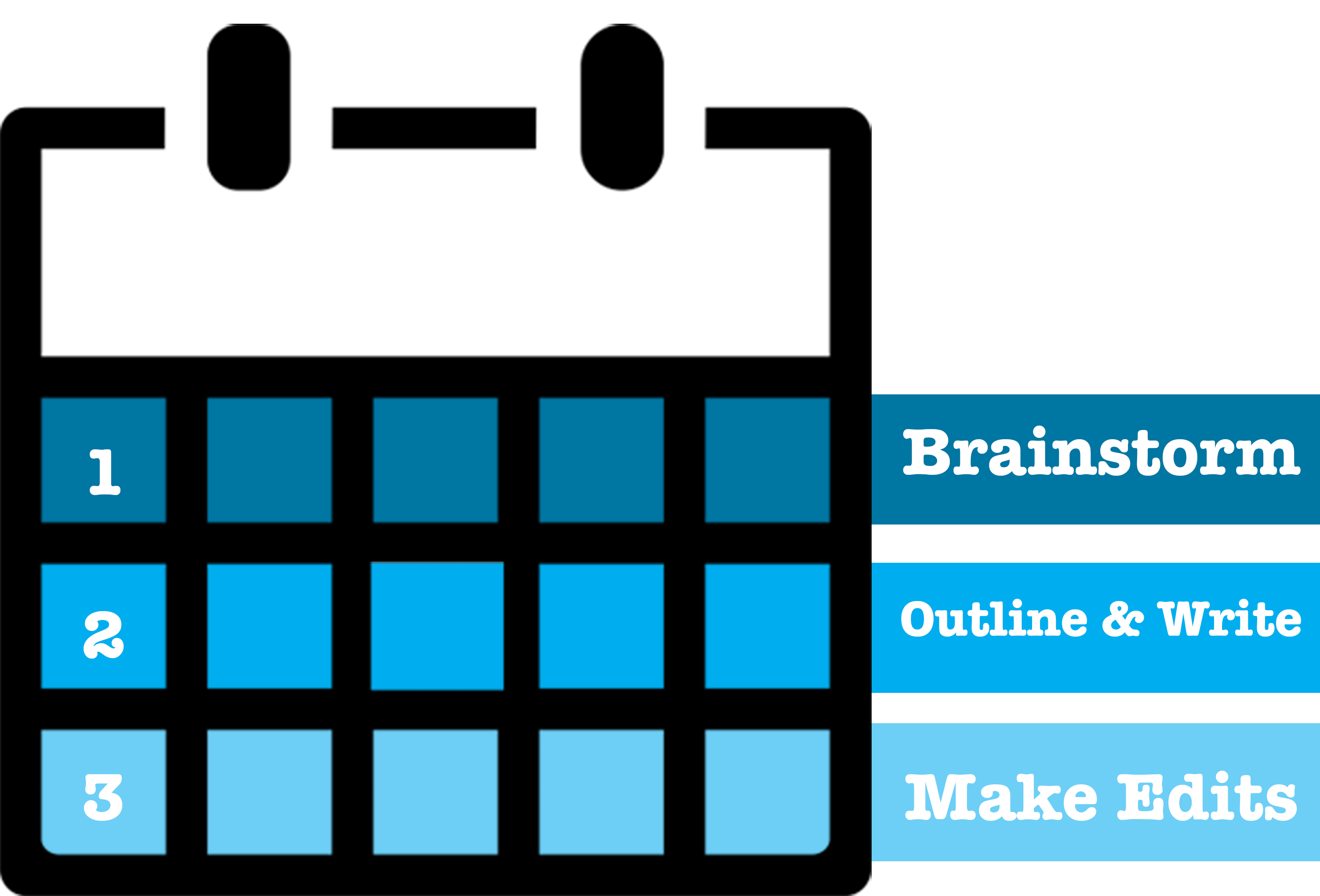
All of this = a better grade on your assignment. You’re already going through all the effort — why not be positive that you’ll get the best results??
2. Read the Guidelines
Ever taken a shirt out of the dryer to find it has shrunk 10 sizes too small?
It’s because the shirt probably wasn’t meant to go in the dryer, and if you had read the tag, you’d have saved yourself one whole article of clothing!
Before you even START on writing a research paper, READ THE GUIDELINES.
- What is your teacher looking for in your essay?
- Are there any specific things you need to include?
This way, you don’t have to finish your essay only to find that it needs to be re-done!
3. Brainstorm research paper topics
Sometimes we’re assigned essays where we know exactly what we want to write about before we start.
Write an essay on my favorite place to travel?? I know what we are going to choose!
But there are probably more times where we DON’T know exactly what we want to write about, and we may even experience writer’s block.
To overcome that writer’s block, or simply avoid it happening in the first place, we can use a skill called mind-mapping (or brainstorming) to come up with a topic that is relevant and that we’re interested in writing about!
Here’s an example of a mind-map I just did for Influential People!
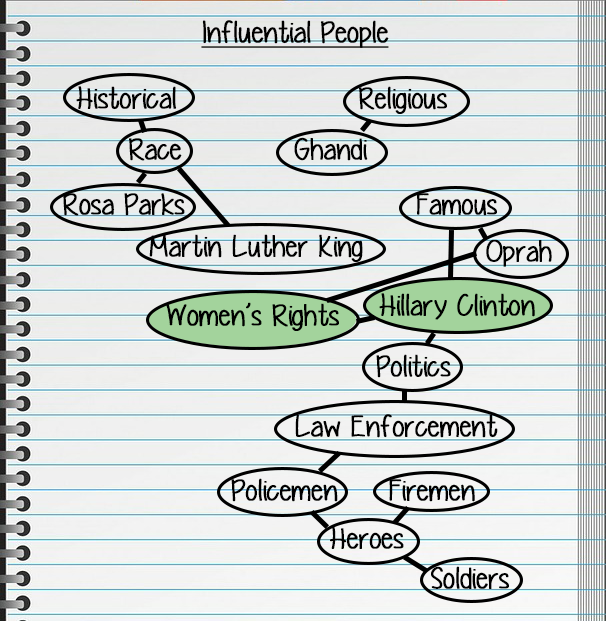
By writing whatever came to my mind and connecting those thoughts, I was able to come up with quite a few influential people to write about — I could come up with EVEN MORE if we kept writing!!
See here we can choose to write about Hillary Clinton and how she may have an influence on women and women’s rights in society.
Following this method, you can determine your own research paper topics to write about in a way that’s quick and painless.
4. Write out your questions
To get the BEST research, you have to ask questions. Questions on questions on questions. The idea is that you get to the root of whatever you are talking about so you can write a quality essay on it.
Let’s say you have the question: “How do I write a research paper?”
Can you answer this without more information?
Not so easy, right? That’s because when you “write a research paper”, you do a lot of smaller things that ADD UP to “writing a research paper”.
Break your questions down. Ask until you can’t ask anymore, or until it’s no longer relevant to your topic. This is how you can achieve quality research.
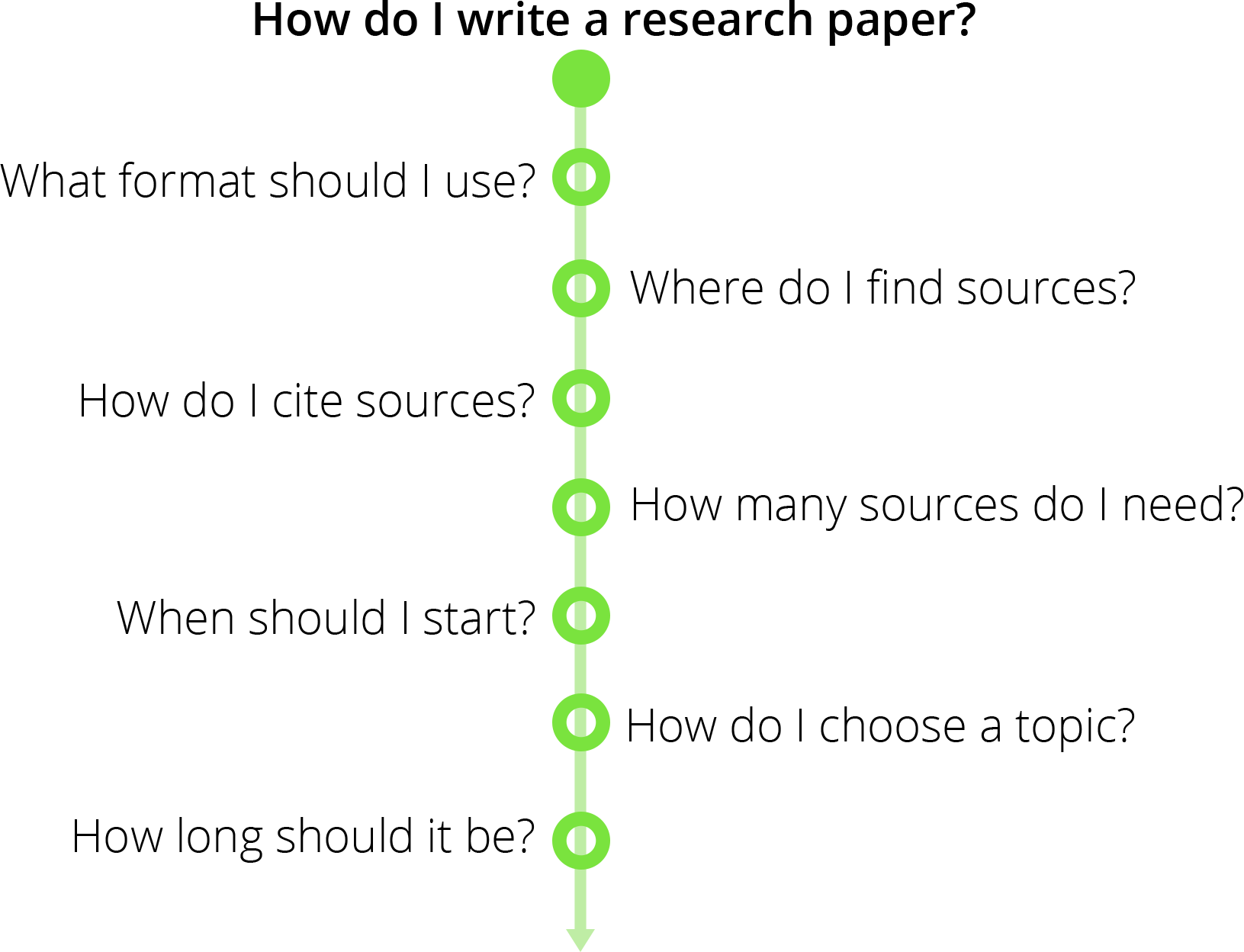
5. Do the research
It IS a research paper, after all. But you don’t want to just type all your questions into Google and pick the first source you see. Not every piece of information on the internet is true, or accurate.
Here’s a way you can easily check your sources for credibility: Look for the who, what, and when.
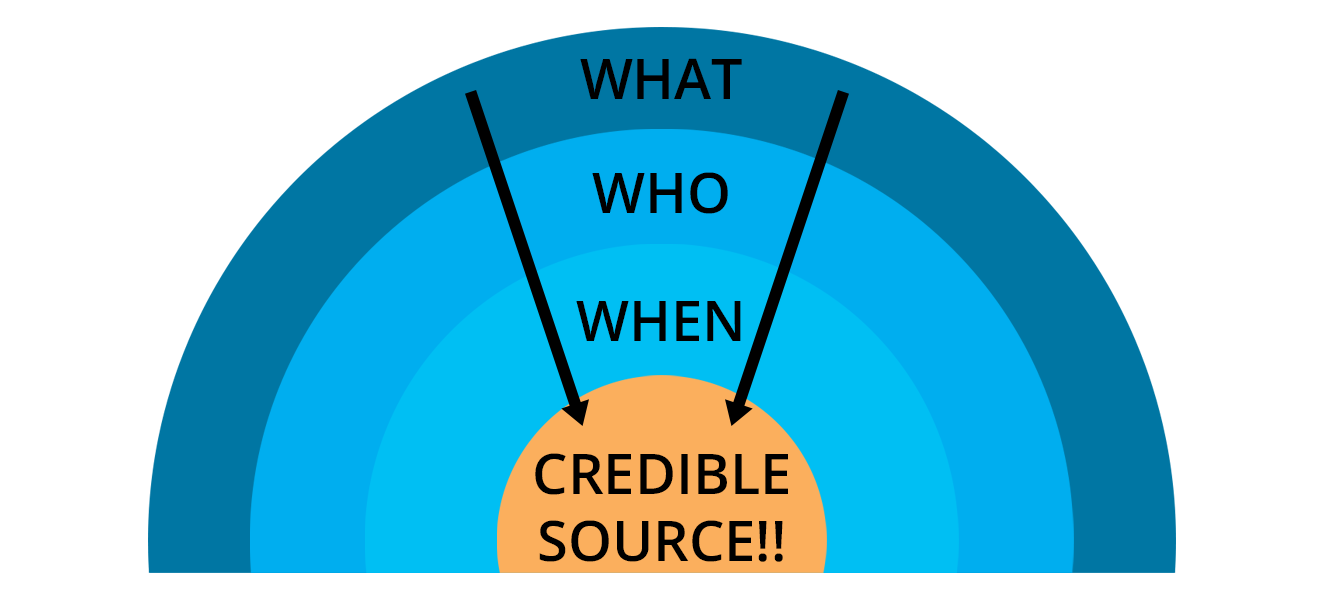
WHO
- Who is the author of the source?
- What are they known for?
- Do they have a background in the subject they wrote about?
- Does the author reference other sources?
- Are those sources credible too?
WHAT
- What does the “Main” or “Home” page of a website look like?
- Is it professional looking?
- Is there an organization sponsoring the information, and do they seem legitimate
- Do they specialize in the subject?
WHEN
- When was the source generated — today, last week, a month, a year ago?
- Has there been new or additional information provided since this information was published?
Double-check all your sources this way. Because this is a custom research paper, your writing is meaningless without other sources to back it up.
Keep track of your credible sources!
When you find useful information from a credible source, DON’T LET IT GO. You need to save the original place you found that information from so that you can cite it in your essay, and later on in the bibliography.
You don’t want to have to go back later and dig up the information a second time just to list the source you got it from!
To help with this, you may be familiar with the option to “Bookmark” your pages online — do this for online sources.

There IS another tool you can use to keep track of your sources. It’s called Diigo, and it’s what we use at Student-Tutor to build an online database of valuable educational resources!
You can create a Diigo account and one free group for your links. Check out this video on how to use Diigo to save all your sources in one convenient location.
Now, of course, there are other ways besides the Internet to get information, and there’s nothing wrong with cracking open a well-written book to enrich your essay’s content.
Ways to get information when writing a research paper
- The Internet
- Books
- Newspapers
- Magazines
- Journals
- Interviews

6. Create a Thesis Statement
How to write a thesis statement is something that a lot of people overlook. That’s a mistake.
The thesis statement is part of your research paper outline but deserves its own step. That’s because the thesis statement is SUPER important! It is what sets the stage for the entire essay.
How do you write a thesis statement?
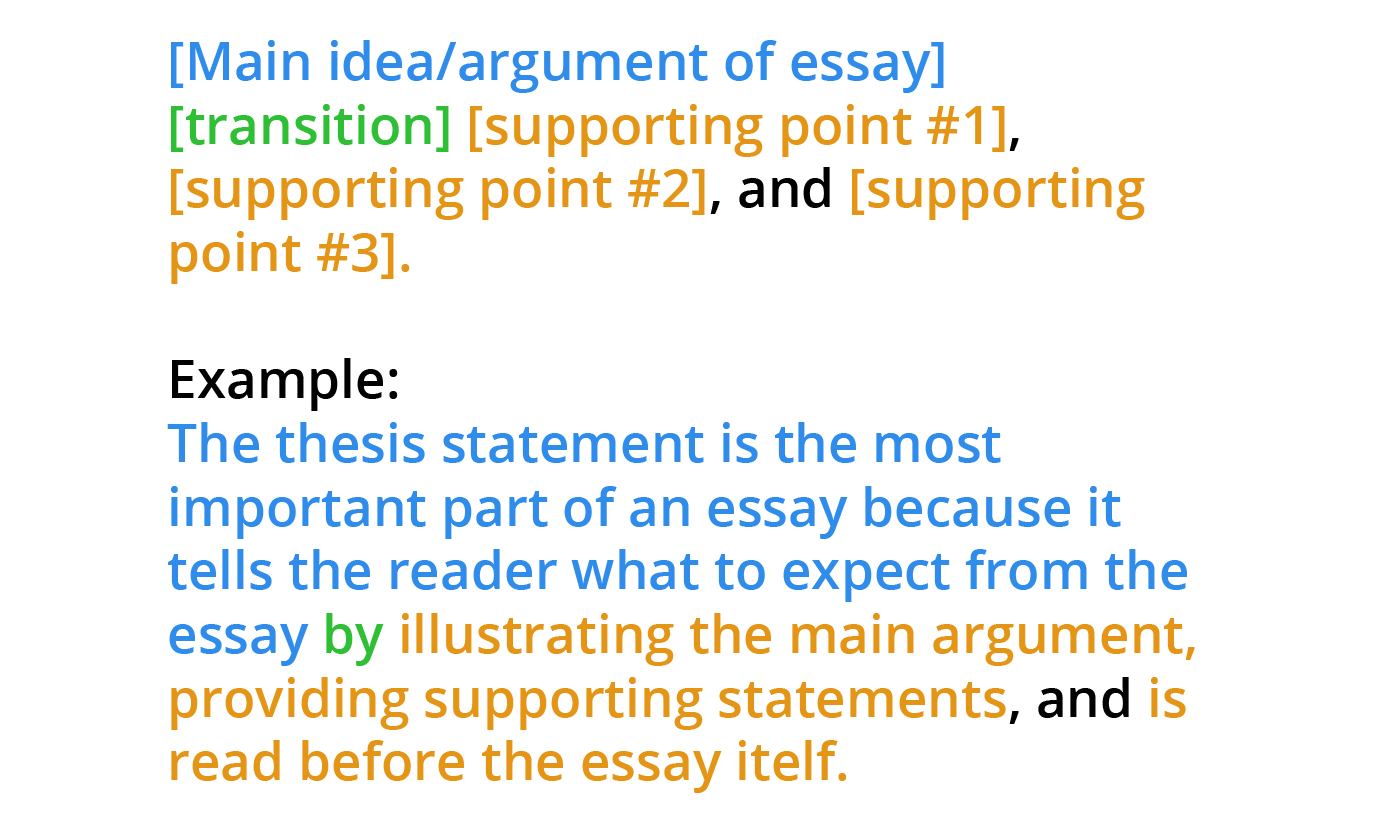
Here’s a color-coded example:
7. Create an outline
Once you have constructed your thesis, the rest of the outline is pretty simple. It should mimic the structure of your thesis and feel like you are starting to write an essay!
Here’s a color-coded research paper outline you can follow:
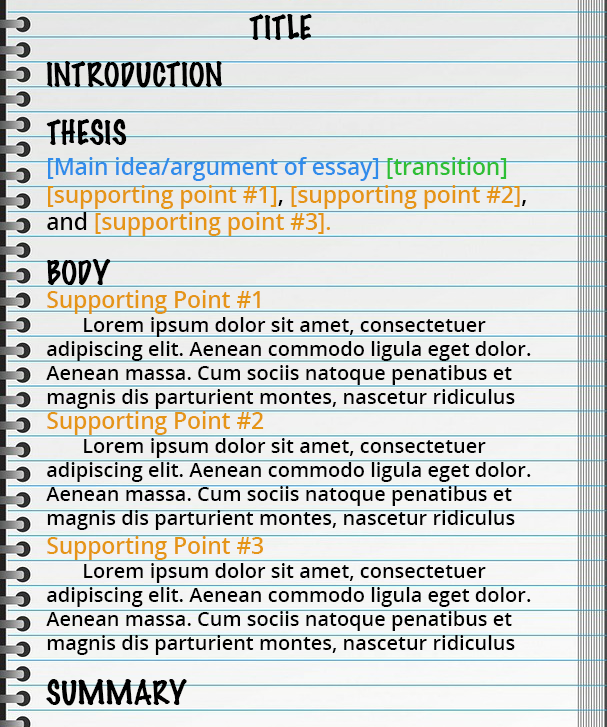
8. Write your research paper
Here it is — the dreaded writing. But see how far we’ve already come?
We already know what we’re going to write about, and where we’re going to write it. That’s a lot easier than taking a pen straight to your paper and hoping for some magical, monk-like inspiration to come, are we correct?
As you write, be sure to pin-point the places where you are inserting sources. We’ll talk about in-text citations in just a moment!
Here are some basic tips for writing your essay from International Student:
- Generally, don’t use “I/My” unless it’s a personal narrative
- Use specific examples to support your statements
- Vary your language — don’t use the same adjective 5 times in a row
PRO TIP: Write is using a FREE app like Grammarly so it catches all your grammar and spelling mistakes! Click here to download it for FREE!

9. Cite your sources
This goes along with the second step — make sure to check your essay guidelines and find out BEFOREHAND what kind of citation style your teacher wants you to use.
Like we promised earlier, Purdue University has a great article that provides instructions on and examples of how to cite different types of sources WITHIN your text. Reference this when you’re not sure what to do.
As a general rule of thumb, in-text citations usually go AFTER the sentence drawing from the source, but BEFORE the period of that sentence, in parentheses. If more than one sentence is referencing the same source, try to place it at the last of those sentences.
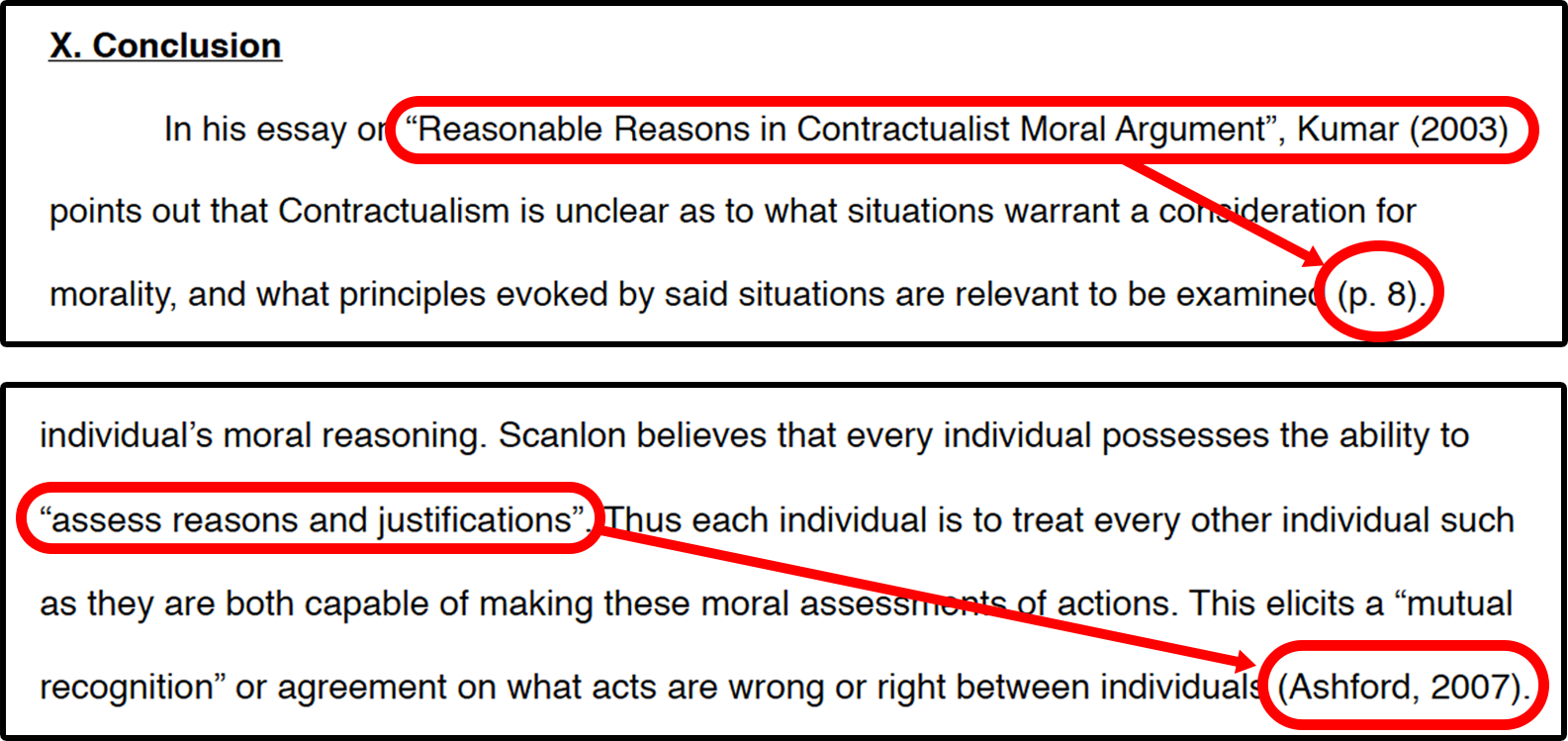
However, no matter what you cite in your writing, all the sources you use for the paper need to be included in your bibliography.
This goes on a separate page, after your main essay and may be titled “Works Cited” or “Bibliography”. (Make sure to check the guidelines and ask your teacher!)
For this, we’re going to introduce you to an awesome, totally free citation tool called EasyBib.
Important Tip: Make sure that when you use EasyBib, you are filling in a template provided by EasyBib and NOT asking EasyBib to pull information directly from the source. EasyBib can’t always find information that is there, and your citation will be incomplete without it!n28

By selecting “Manual Cite”, EasyBib will provide you with a template for filling in the necessary information to create your citation.
You can then ask EasyBib to generate the source in the citation format you’ve selected. Copy and paste that source into your bibliography — easy!
10. Read your essay
Why do I need to read my essay if I wrote it?
You’d be surprised what you’ll catch the second, third, and bazillionth time around reading your own writing! Not that you have to read THIS a bazillion times… just once or twice over will do.
We recommend that you read your essay once-through, and the second time read it aloud. Reading your essay aloud reinforces your words and makes it easier to recognize when something is phrased strangely, or if you are using a word too often.
And if you use a tool like Grammarly it will even give you tips on using active vs. passive voice. Not sure what that means? It tells you!
Seriously… we know we keep talking about this app but it is a lifesaver!
Click here to get the app for FREE!
11. Have someone else read your essay
Lastly, it is always important that someone else besides you read your essay before you submit it. This is one of the secrets of writing a good essay.
Find a professional who can give you constructive feedback on how to improve your essay — this may be a tutor or a teacher. It can also be someone who specializes in the subject you are writing about.
The absolute BEST person to review your essay would be the teacher that assigned it to you.
And yes, many teachers WILL read the essay they assigned before it is due and give you pointers on how to make it better. They want you to succeed and they’re the ones grading it — we think it’s safe to say they know what they’re talking about!
Conclusion: How to Write a Research Paper
For most of us, writing a research paper is no walk in the park. Unfortunately, it’s important that you know how to do it!
Let’s review the steps to make this process as PAINLESS as possible:
- Start early — 3 weeks in advance!
- Read the guidelines
- Mind map/Brainstorm research paper topics
- Write out your questions
- Do the research (Remember to keep track of your sources!)
- Create a Thesis Statement
- Create an outline
- Write your essay
- Cite your sources (In-text and in your bibliography)
- Read your essay (twice and once aloud!)
- Have someone ELSE read your essay — try your teacher first.
Do you have experience writing a research paper? What process did you use, and was it effective? Tell us about it in the comments below!
In addition, if you haven’t already… please download Grammerly! We would hate for you to hand in your research paper and for it to have all these grammar and spelling errors that Microsoft Word doesn’t catch!
Bonus… it is FREE! Click here to download now!

Todd VanDuzer
Latest posts by Todd VanDuzer (see all)
- Why Finding the Right Thing to Study Matters: Setting the Foundation for Success - July 26, 2023
- How USA Staff Onboarding Benefits From Innovative Software - July 26, 2023
- Top 7 Best Reasons to Get an MBA - June 7, 2023
- How to Support Your Child When They Go to College - April 29, 2023
- How to Maximize Your Job Search with Expert Resume Writers Experienced in Your Field - April 20, 2023



Don’t write too quickly, take as much time as possible as to gather the best information available. And if you have time, you could always change certain parts to include better info, too!
Thanks for the tip!